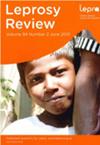在埃塞俄比亚麻风病患者中验证阿姆哈拉语版本的36项简短健康调查(SF-36)
IF 0.8
4区 医学
Q4 DERMATOLOGY
引用次数: 0
摘要
背景:健康相关生活质量(HRQoL)已成为许多随机临床试验和其他研究中不可或缺的结果测量指标。它为衡量健康状况的改善或下降以及评估治疗效果提供了患者的意见。埃塞俄比亚的麻风病临床试验需要一个经过验证的阿姆哈拉语版本的HRQoL评估工具。SF-36被选中了,但是没有经过验证的阿姆哈拉版本。我们描述了这是如何发展起来的。方法将SF-36从英文翻译成阿姆哈拉语,并在患者焦点组中评估其内容的可接受性。进行反向翻译。对在ALERT医院麻风病诊所就诊的100名麻风病患者进行了阿姆哈拉语SF-36在麻风病患者中的有效性和可靠性测试,并与阿姆哈拉语版本的WHOQOL-BREF进行了比较。结果WHOQOL-BREF和SF-36的阿姆哈拉语版本在麻风人群中具有良好的信度和效度。每个域/尺度的内部一致性可靠性估计超过0.70。Amharic SF-36在本组患者中的收敛效度和判别效度均优于WHOQOL-BREF。在麻风病患者中WHOQOL-BREF和SF-36均有良好的已知组效度。阿姆哈拉语SF-36具有良好的等级间信度,8个域中有7个域的等级内相关得分在0.8以上。结论阿姆哈拉语版本的SF-36是衡量埃塞俄比亚麻风病患者研究和临床环境中HRQoL的有效工具。本文章由计算机程序翻译,如有差异,请以英文原文为准。
Validating an Amharic version of the 36-Item Short Form Health Survey (SF-36) in individuals with leprosy in Ethiopia
Background Health-related quality of life (HRQoL) has now become an indispensable outcome measure in many randomized clinical trials and other studies. It provides the patient’s voice in measuring health improvement or decline and assessing treatment effectiveness. A validated Amharic version of HRQoL assessment tool was needed for leprosy clinical trials in Ethiopia. The SF-36 was chosen but a validated Amharic version was not available. We describe how this was developed. Methods The SF-36 was translated from English into Amharic and evaluated for content acceptability in a patient focus group. Back translation was performed. Validity and reliability of the Amharic SF-36 in leprosy affected individuals was tested with 100 patients with leprosy attending the leprosy clinic at ALERT hospital and compared to the Amharic version of the WHOQOL-BREF. Results Amharic versions of both the WHOQOL-BREF and the SF-36 had good reliability and validity amongst leprosy affected individuals. Internal consistency reliability estimates for each domain/scale exceeded 0.70. The Amharic SF-36 had better convergent and discriminant validity than WHOQOL-BREF in this group of patients. Good known-group validity was seen in both WHOQOL-BREF and SF-36 in leprosy affected patients. The Amharic SF-36 had good inter-rater reliability with seven out of 8 domains scoring above 0.8 in intra-class correlation. Conclusion This Amharic version of the SF-36 is a valid instrument to measure HRQoL in studies and clinical settings involving leprosy affected individuals in Ethiopia.
求助全文
通过发布文献求助,成功后即可免费获取论文全文。
去求助
来源期刊

Leprosy review
医学-病理学
CiteScore
1.10
自引率
16.70%
发文量
35
审稿时长
>12 weeks
期刊介绍:
Leprosy Review is an Open Access peer reviewed journal including original papers on all aspects of leprosy. Topics published include research into the medical, physical and social aspects of leprosy and information relevant to leprosy control. We publish original research, short reports, case studies and reviews. The vision of the journal is to improve the management and control of leprosy and its consequences, by publishing relevant research and sharing experiences and best practices.
 求助内容:
求助内容: 应助结果提醒方式:
应助结果提醒方式:


